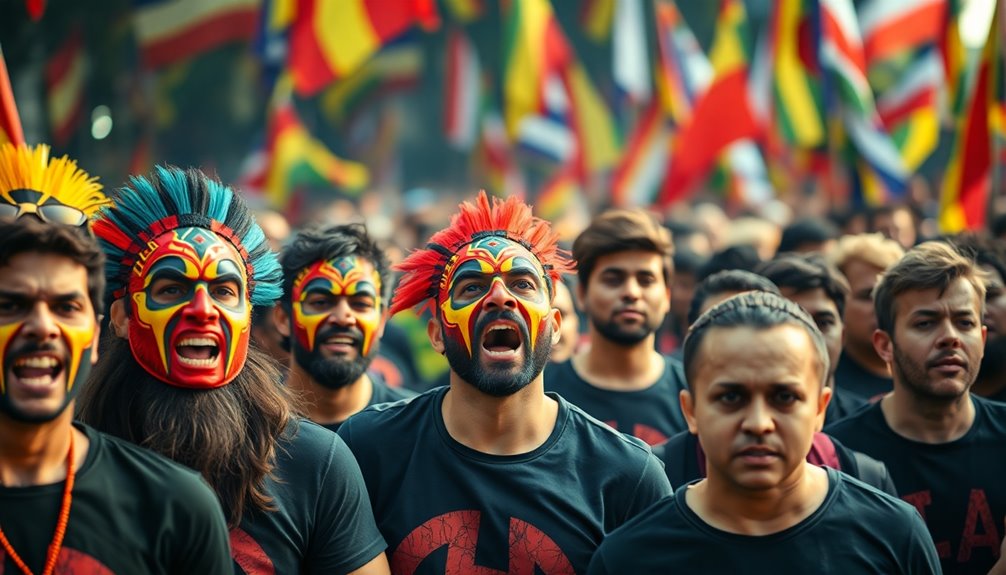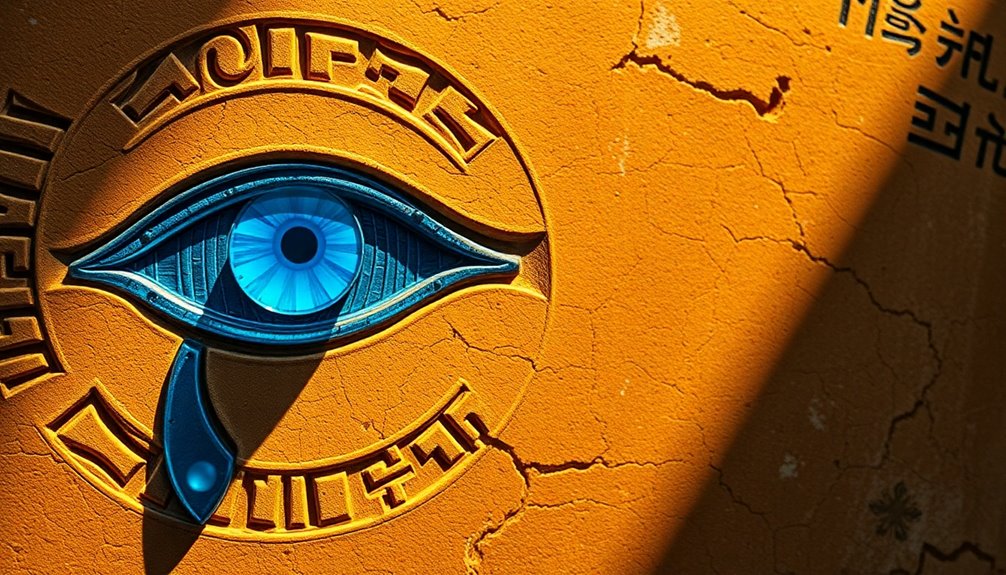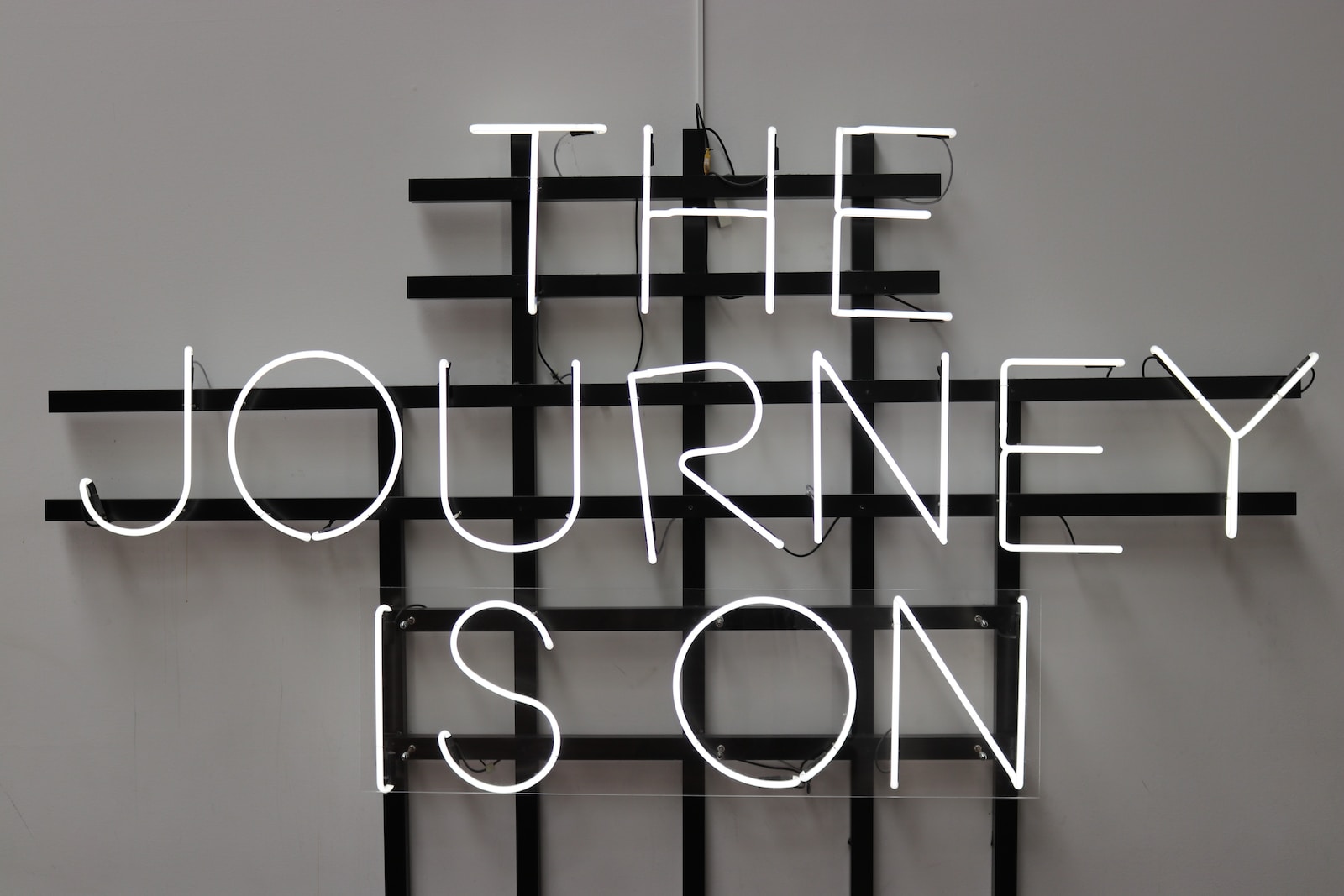Tribalistic behavior shows how group mentality can strongly shape your perceptions and actions. You'll feel a powerful bond with your group, often sidelining outsiders. This ingroup favoritism leads to biased decisions and can escalate into conflict, especially in today's polarized environment. You might also find that groups often fall into groupthink, where consensus trumps critical thinking. This can create an illusion of invulnerability, making you overlook potential risks. Understanding these dynamics is essential, as it can foster empathy and open dialogue. There's a lot more to uncover about these behaviors and their implications on your interactions.
Key Takeaways
- Tribalism fosters ingroup favoritism, leading to biased resource allocation and marginalization of outsiders.
- Groupthink can result in irrational decision-making, as consensus takes precedence over critical evaluation.
- Social isolation from differing viewpoints can reinforce negative perceptions and foster outgroup derogation.
- Political polarization and structural inequalities deepen divisions within communities, threatening social cohesion.
- Engaging with opposing perspectives and fostering empathy can mitigate the impacts of tribal behavior.
Defining Tribalism and Its Roots

Tribalism, at its core, represents a powerful human tendency to form strong bonds with specific groups, often at the expense of outsiders. As social creatures, human beings naturally crave belonging and identity, driving you to affiliate with groups that reflect your values and interests. This psychological need often leads to ingroup favoritism, where you make decisions that prioritize your group's interests over those of outgroup members.
Research by Henri Tajfel illustrated how quickly you can form groups based on arbitrary criteria, highlighting the cognitive biases that emerge almost instantly. This favoritism manifests in how you allocate resources, often favoring your ingroup while derogating those from outside.
The roots of tribalism run deep, tied to fundamental needs for status and security within a community. As competition for resources intensifies, tribalism can escalate, leading to harmful behaviors and, in extreme cases, conflict. The current global political climate, characterized by increased focus on populism, further illustrates how tribalistic tendencies can shape national policies and international relations.
Recognizing these patterns in your own behavior can be essential. By understanding the dynamics of tribalism, you can foster a more inclusive mindset, ultimately mitigating the negative consequences that arise from prioritizing group over individual humanity.
The Psychology Behind Groupthink

When you're part of a cohesive group, the desire for harmony can sometimes cloud judgment, leading to a phenomenon known as groupthink. This psychological phenomenon occurs when cohesive groups prioritize consensus over critical evaluation, resulting in flawed decisions we make.
Key characteristics of groupthink include the suppression of dissenting opinions and collective rationalization, where group members convince themselves that their choices are infallible.
The human brain often seeks comfort in agreement, which can lead to an illusion of invulnerability. This overconfidence causes groups to underestimate risks and overlook warning signs, sometimes with catastrophic results, as seen in historical events like the Bay of Pigs invasion.
High group cohesiveness, along with structural faults like isolation from external viewpoints, increases the likelihood of groupthink.
To combat this issue, awareness of group dynamics is essential. Promoting open dialogue fosters an environment where diverse perspectives are valued, encouraging critical thinking.
Consequences of Tribal Behavior

Group dynamics often lead to tribal behavior that can have profound consequences on social interactions and decision-making processes. You might notice ingroup favoritism and outgroup derogation where resources are allocated preferentially to your group while harboring negative views of others. This can fuel political polarization, as seen with shifts in public beliefs, like the NFL's declining popularity among Republicans after political controversies.
The following table illustrates some key consequences of tribal behavior:
| Consequences | Description |
|---|---|
| Ingroup Favoritism | Preference for your group over outsiders |
| Outgroup Derogation | Negative perceptions and treatment of other groups |
| Groupthink | Consensus-driven decision-making, often irrational |
| Social Isolation | Severing ties with external support systems |
Tribal affiliations can create cohesive groups, yet they can also lead to societal divisions and conflicts. Trivial differences may escalate into major animosities, undermining open dialogue and cooperation across diverse communities. As tribal behavior persists, these consequences can create barriers that hinder progress and understanding in society. Additionally, the importance of clear communication during group conflicts can play a crucial role in mitigating these negative effects.
Strategies for Overcoming Division

The consequences of tribal behavior can feel overwhelming, but there are effective strategies to bridge divisions and foster understanding. Start by emphasizing individual identity over group identity; this helps you recognize personal traits and differences that transcend affiliations.
Engaging with opposing viewpoints is fundamental, as it promotes cognitive flexibility. Exposure to diverse perspectives encourages critical thinking and reduces the risk of groupthink.
Developing empathy is important too. By understanding the motivations behind differing beliefs through the theory of mind, you can facilitate more productive dialogues across divides.
Focus on building shared identities and collaborative efforts, as these initiatives greatly reduce polarization and promote social cohesion in diverse communities.
Lastly, commit to continuous learning and self-reflection. Challenge your own biases and remain open to evolving perspectives on tribalism and group dynamics. Additionally, consider incorporating mindfulness practices to enhance emotional regulation and reduce reactivity during discussions.
Future Implications of Tribalism

Tribalism's grip on society poses significant challenges for our future, as increasing political polarization and social isolation threaten to fragment communities. When you align your social identity strictly with a group of people, you risk limiting your exposure to diverse perspectives. This isolation can lead to irrational decision-making, as cohesive groups often fall victim to groupthink, overlooking critical evaluations and alternative viewpoints.
Moreover, structural inequalities based on race and socioeconomic status deepen these divisions, making it essential to address these disparities. The rise of consumer capitalism further segments individuals into niche groups, reinforcing tribal identities and hindering collaborative efforts for societal change.
To combat these implications of tribalism, we must promote empathy and open dialogue. Studies suggest that engaging with diverse experiences enhances cognitive flexibility, enabling you to think critically and reduce tribalistic behaviors.
Frequently Asked Questions
What Is a Tribalistic Mentality?
A tribalistic mentality is when you strongly identify with a specific group, placing its interests above those of outsiders.
This often leads to favoritism towards your group and hostility toward others. You might find yourself prioritizing group loyalty, shaping your beliefs and behaviors to fit.
This mentality can emerge from a deep-seated need for belonging and identity, often intensified by social influences and environments that promote extreme viewpoints and division.
What Is a Tribe Mindset?
A tribe mindset is when you identify closely with a specific group that shares your beliefs, values, or identity.
It often leads you to favor your group while viewing outsiders with suspicion or disdain. This "us versus them" mentality can influence your thoughts and behaviors considerably.
You might find yourself prioritizing group loyalty over individual judgment, which can create barriers to understanding and cooperation with others, ultimately affecting your relationships and perceptions of the world.
What Is Tribalism and Why Is It a Bad Thing?
You might think tribalism's harmless, but it can be quite damaging.
Tribalism occurs when you prioritize your group over others, leading to conflict and division. It breeds ingroup favoritism, where you favor your own, often at the expense of outsiders.
This mindset can foster political polarization, suppress dissenting opinions, and create echo chambers.
Ultimately, it can hinder critical thinking and understanding, making collaboration and societal harmony much harder to achieve.
What Is the Theory of Tribalism?
The theory of tribalism suggests that humans have an inherent tendency to form strong bonds within groups, prioritizing their interests over others.
You might notice this in social, political, or cultural contexts, where loyalty to your group can lead to favoritism and bias against outsiders.
This behavior can foster division and conflict, as it often results in irrational decision-making and a lack of empathy for those outside your group, hindering effective communication and collaboration.
Conclusion
As you reflect on the insidious nature of tribalism, consider what it means for your own beliefs and relationships. Can you spot the subtle cues of groupthink creeping into your life? What happens when you challenge the status quo? The choice is yours: remain in the comfort of conformity or venture into the uncertain territory of independent thought. The future of connection, understanding, and unity hangs in the balance, waiting for you to take the first step.









